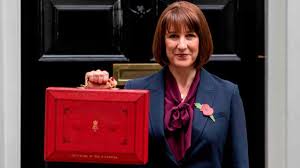Budget Review 30th October 2024

Budget Announcement 2024 – Payroll Implications
As the Labour Government announce their first budget in 14 years, we have cast our eyes on the implications the announcement may have on our client’s payrolls. With the rising cost of living still at the forefront of decision-making, this budget will be crucial for employers and employees alike. In this blog post we will delve into the changes announced by the government and the effects that this may have on employer’s costs and employee’s taxation.
National Minimum Wage
As part of the budget announcement, the government have confirmed the national minimum wage rates for the upcoming 2025/26 tax year. These rates are as follows:
- Age 21+ - £12.21 an hour a rise of (6.7% increase from 2024/25)
- Ages 18-20 - £10 an hour (16.27% increase from 2024/25)
- Aged under 18 - £7.55 (17.97% increase from 2024/25)
- Apprentice Rate - £7.55 (17.97% increase from 2024/25)
The above increases mean that an employee working 37.5 hours per week would see the below increases in their annual pay:
- Age 21+ - £1501.50
- Ages 18-20 - £2730.00
- Aged under 18 and apprentices - £2242.50
The differing rates of increase over the age groups are the first step towards meeting the government’s target of having a single adult rate.
Employee Taxation
Some welcome news for employees is the confirmation that both tax and employee national insurance rates will not increase and will remain at current rates. This means that employees will not see an increase in either their tax or national insurance.
Under the previous government, both the income tax and employee national insurance thresholds were frozen until the end of 2027/28. The current government have announced that they will not be continuing that freeze past the decision making of the previous government and from 2028/29 rates of income tax and employee national insurance will begin to rise again inline with the rate of inflation.
Employer’s National Insurance
The most significant announcements affecting payroll and employer costs is the announcement of changes in Employer’s National Insurance.
From April 2025, the employer’s rate of insurance will rise from 13.8% to 15%. In addition to this the secondary threshold is being reduced from £9100 to £5000 per year. Both of these changes will cause increases in the amount of national insurance that employers need to pay.
For an employee earning £30,000 per year on a standard A NI Table, the employer will see their annual national insurance contribution increase from £2884.80 to £3750.
For an employee earning £50,000 per year on a standard A NI Table, the employer will see their annual national insurance contribution increase from £5644.80 to £6750.
This will be a large increase in employment costs for employers which the chancellor acknowledged in their statement. For this reason they have announced that the Employment Allowance will increase from £5,000 to £10,500 and will be extended to all eligible employers removing the £100,000 cap from 6th April 2025. The chancellor stated that this will mean 865,000 employer’s will not pay any national insurance next year. They also stated that one million companies will pay the same or less as they did previously.








Comments